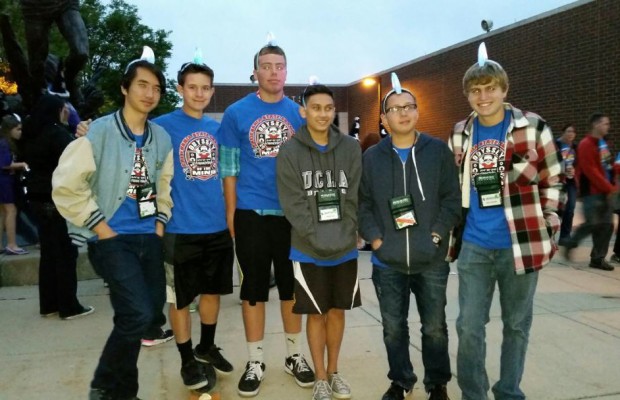Solutions and Success: Odyssey of the Mind team attends World

After three months of preparation, constantly revising ideas, and tapping into the creative side of their brains, sophomores Steven Owens, Conrad Jones, Alex Meinhof, Dillon Penix, Josh Rose, and Bennett Phan arrived at the Odyssey of the Mind world championships.
“I would describe Odyssey of the Mind as a creative learning competition,” Owens said. At the beginning of the year, teams are given a variety of verbal and hands-on problems. Students spent the next three months preparing a solution for one of these problems in the form of a skit. As a team, they create a script, costumes, and props for their skit and perform it before a group of judges in three rounds of competition. At these competitions, the team also solves a “spontaneous” problem that they are given on the day of the competition.
The problems are geared towards different skill sets. “Every year there’s a drama problem which is entirely script and humor,” Meinhof said. Owens explained that the team chose to do this problem instead of a technical one because “our team is very creative.”
The problem that they chose to solve required them to create a skit based on the Greek myth Pandora’s Box. However, the myth had to be presented in a video game structure, with multiple levels in which the hero faced evils from Pandora’s box.
“We did a theme of the Internet (from) 20 years ago,” Meinhof said. “So (the evils were) hate which was forum trolls, and then it was greed which was a Nigerian prince scamming someone for money, and then gluttony which was a fat guy.” In addition to these characters, the skit had a narrator who spoke only in limericks.
Coming up with an idea and creating a script kept the team busy for months. “It takes a long time because you kind of figure out a way to do it differently,” Jones and narrator of the skit, said. He added that the team works together to try and think of the most unique way to approach the problem.
After placing first in the local round of the Odyssey of the Mind competition, the team qualified to move on to the state round. At this competition, the team tied for second place, allowing them to continue on to the world competition.
“Our spontaneous (score) really pulled us through (at the state competition) because that’s worth about half your points and we got first,” Owens said.
On May 21, the team performed their skit in the world competition at Michigan State University. Two days later, the team completed their spontaneous problem, which was a hybrid of both verbal and hands-on problem solving. “We’d never seen a problem like that before,” Meinhof said.
Jones explained that many of the other performances they saw were similar to one another. “Ours was very very different so it was interesting to see,” Jones said.
“I think what separates us from other teams is just our ability to be more creative. We don’t really fear … the judges,” Owens said.
According to Owens, the team expected to place in the lower half of approximately 60 teams in their division. They were surprised to find out that they had received 14th place. “I thought they must have made a mistake,” Meinhof said.
Meinhof explained that he values the environment that Odyssey of the Mind has created for students. “I enjoy it because it’s something that’s creative. It’s something that allows you to be sort of strange and weird and then that’s supported,” Meinhof said. “It really leads to real world scenarios where you’re working with a team and may have conflicting ideas.”
